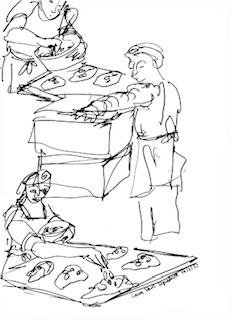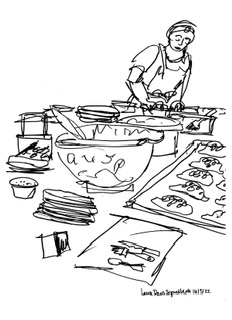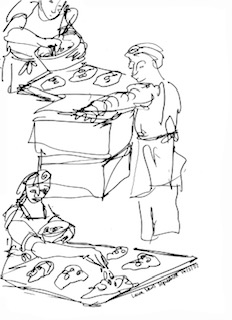My World Cafe by David Wilson, illustrated by Laura Davis
Riversmeet productions, Exeter, 2022
Review of a recipe book with a difference
‘Heritage tomatoes’ that’s the name I know for green, yellow and orange tomatoes today. But that’s how they were first thought to have been cultivated by by the Aztecs in the Andes mountains. The name comes from the Aztec word tomatl and it took years of breeding to give us the red tomato. What’s more, acquiring the tomato was not innocent, as David Wilson points out in his recipe for Tomato curry with chana: “The Spaniards came with a sword in one hand and a plate in the other. Along with gold and silver, Europe got potatoes, tobacco, peppers and tomatoes. Indigenous Americans got colonisation, disease, slavery and war.” Furthermore, the tomato took its place in medieval times amongst the poor, who ate off wooden boards, whilst being shunned by the rich, who were apt to be poisoned when the acid from the tomato leached out the lead from their pewter plates.
This recipe book is about memories of people and places, tastes and smells, where foods come from, how they are adopted and transformed, in different parts of the world. Proust may have immortalised the importance of taste for memories in his epic In search of lost time, but Wilson wraps every recipe in history and culture, people and his own personal encounters.

I’m possibly just revealing my own ignorance, but another surprise came with quiche Lorraine. This was a staple of my French colleagues whenever we met socially for a ‘bring a dish’ gathering. The word quiche is a corruption of the German word Kuchen and the food originated from the kingdom of Lothringen, renamed Lorraine when taken over by the French. Wilson’s point is about poverty, hunger and inequality: “Inequity, not food shortage, was at the root of most famines in the 19th and 20th centuries. The Irish Famine (more honestly referred to as the Irish ‘Hunger’) took place while Irish food was sent to England. During the Bengal Famine of 1942-43 the British exported the region’s grain, pushing up prices and leaving 3 million to die. Speaking in 1943, Winston Churchill said, ‘I hate Indians ……the famine was their own fault for breeding like rabbits’”. Quiche Lorraine is that it is cheap and nutritious; a recipe for it was broadcast as part of the 1926 radio show Aunt Sally’s Radio Recipe – Aunt Sally was a character created by the US Bureau of Home Economics.
Apfelstrudel is another recipe I always associated with the Germanic world, more specifically with Vienna, supposedly its place of origin. This time, Wilson locates this delicacy as an Assyrian dessert in 8th century BC, in other words in Mesopotamia or modern day Iraq. “Many centuries later, in 1683, Ottoman armies besieged Vienna, but failed to conquer the city. Their pastry, if not their soldiers, made it over the walls and laid the foundation for apfelstrudel. Not content with giving us the origin of this pastry, Wilson explains that cinnamon is dried bark from the Cinammon zylanicum tree and originated from Sri Lanka. It was both precious and valuable and the ancient Egyptians used it for embalming.

Wilson’s recipe for Burritos iswrappedaroundhis experience of a hospital stay in Bart’s hospital for heart surgery. Bart’s is simultaneously a site of butchery (Spitalfields market is no longer) and healing since the first hospital was built in 1123. “The area had also been a place of execution. On a wall enclosing the hospital is a plaque that says that the Scottish rebel leader, William Wallace – Braveheart- was hung, drawn and quartered here in 1315 [I intend to hunt this down next time I visit]. 60 years later, Wat Tyler, leader of the Peasants’ Revolt, was decapitated at the same spot and his head stuck on a pike.” The food at the hospital was inedible. It hadn’t always been that way when it had been cooked on site. But by the time of Wilson’s stay, it had been outsourced to SERCO and the food, prepared in Newport, South Wales, was transported to London overnight. The nurses were no longer on NHS pay and conditions and treated as agency staff. So Wilson’s wife Anne brought in burritos instead. [ A successful strike led to an agreement to take all SERCO staff back in house in 2023 but the catering is still outsourced to another company. ]
Bread is important the world over and David Wilson, amongst many other things, was co-founder of the charity War Child that set up a war-time mobile bakery to feed starving people in Mostar. Pizza is, of course, based on flatbread, a common form of unleavened bread that is common to all parts of the world and has been around since antiquity. “In the 6th century BC, Persian soldiers cooked flatbreads on their shields and topped them with dates and cheese. In Ancient Greece, they made a flatbread called plakous, flavoured with onions, cheese and garlic. The Romans ate panis focacius..” Most of us know about naans, roti and parathas, these days. The Chinese have bing and the Italians have pizza.During the course of his work that has taken Wilson to different parts of the world, he has always met interesting people as well as many well known personalities. As the first musical director of the Pavarotti Music Centre in Bosnia, Wilson ended up being cooked pizza by Pavarotti himself at his summer home in Pesaro. This account contains the following gem about a lunch with Pavarotti in Capri. “….the waiter broke out into a Neapolitan song after he’d brought us coffee. The Maestro beamed at him and led the clapping.” Small wonder that David describes Pavarotti (one of my own all time favourite singers) as full of generosity, humour and kindness.

Wilson’s discovery of the dish Kabuli Pulau happened as the result of another interesting encounter – this time in a supermarket, with Ken Livingstone, still remembered for his time as former mayor of London, but subsequently driven out of the Labour Party in the start of the witch hunt over alleged anti-semitism. Wilson subsequently met Livingstone with the playwright and Stop the War veteran, Jan Woolf, in an Afghan restaurant. [We went to see her play Blood, Gold, Oil written for the twentieth anniversary of the 2003 Iraq war]. Livingstone remembers the days pre Thatcher, when John Major was Chair of Lambeth’s Housing Committee and “oversaw the building of more council estates than any council, before or since.” They had an interesting discussion about the issue of anti semitism and the deliberate conflation with anti-Zionism, remembering when the Royal Court refused to stage Jim Allen’s play Perdition in 1987. In the course of that conversation, Livingstone points out “under Starmer, more Jews have been suspended from the Party than ever before”. Those targeted include many Jews who acted in solidarity with Palestinians.
There are far too many experiences and recipes to mention then all [get the book!] but I want to finish with two foods: hummus and liver and bacon. Everyone knows about hummus, it’s connections with the Middle East and many people make their own. So I was intrigued to discover that Wilson’s recipe came from a small restaurant opposite the station in Narbonne, southern France, a place I have passed through regularly on my way to stay with friends. Deylem restaurant is now a must stop next time I’m passing through!
And finally liver and bacon. According to Wilson, eating liver and bacon on the other side of London was used as an alibi in a trial for robbery in 1735 and the first recipe, presumably in the UK, appeared in 1825 in A Modern System of Domestic Cookery by Mary Radcliffe. His recipe is from his aunt. But liver and bacon for me is about the Italian cafe across the road from The Socialist Bookshop in Digbeth, Birmingham, centre for the International Socialists and SWP until it was firebombed in 1981. That cafe made the best liver and bacon toasted sandwiches ever…..
Sheila McGregor
August 19 2023
